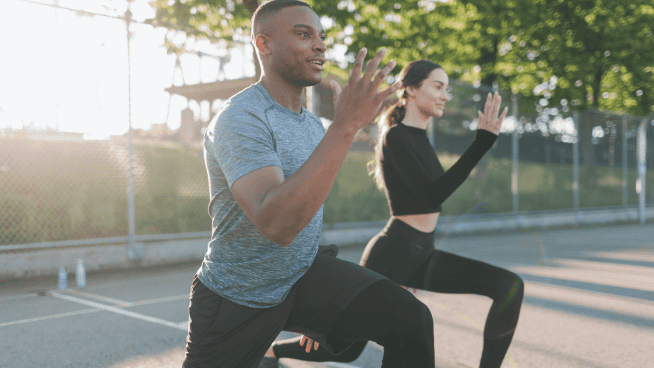LOOK: Nike’s Microclimate Chair Is the Craziest Athlete Recovery Innovation Yet

In sports, especially basketball, you often hear the phrase “keep warm.”
This can refer to preventing a quarterback from contracting frostbite while he waits for his defense to get off the field during a December game in Green Bay; but in most instances, it refers to a player’s muscles. Typically, in the NBA, players move at full tilt for 15-20 minutes, then go to the bench for a rest. But when their muscles and ligaments suddenly become sedentary after an intense flurry of movement, it can mess with their bodies. That’s why some players wear compression sleeves on their arms and legs and others ride a stationary bike during their time on the bench. It’s also why a dynamic warm-up is so important. Coming into a game, especially one as fast-paced as basketball, with completely cold muscles risks serious injury.
Nike’s latest invention aims to address this issue. Created in collaboration with the Los Angeles-based architect Greg Lynn, the “microclimate chair” was debuted at the company’s “Nature of Motion” exhibit. It is only a prototype, but the idea behind it and the technology that powers it are huge for athletes.
Made of both flexible carbon tape and rigid carbon weave, the microclimate chair contains 70 devices that either heat up or cool down when charged. Meant to replace the chairs along a basketball team’s bench, it will allow an athlete to cool his or her spine while warming the muscles around the thigh, leg and ankle. The chair also features a tube around the perimeter that distributes and diffuses air, removing humidity from around the athlete and creating the ideal climate, allowing him or her to be totally fresh when it’s time to re-enter the game.
“If you gave five of these chairs to a college basketball team, they’d have a distinct performance advantage,” Lynn said.
There’s no word on whether or when the microclimate chair will become a practical reality, but if it did, it would be one of the most innovative forms of athlete recovery we’ve seen. Given its potential to limit injuries and keep athletes in peak performance throughout a game, let’s hope the microclimate chair doesn’t remain a prototype for long.
RECOMMENDED FOR YOU
MOST POPULAR
LOOK: Nike’s Microclimate Chair Is the Craziest Athlete Recovery Innovation Yet

In sports, especially basketball, you often hear the phrase “keep warm.”
This can refer to preventing a quarterback from contracting frostbite while he waits for his defense to get off the field during a December game in Green Bay; but in most instances, it refers to a player’s muscles. Typically, in the NBA, players move at full tilt for 15-20 minutes, then go to the bench for a rest. But when their muscles and ligaments suddenly become sedentary after an intense flurry of movement, it can mess with their bodies. That’s why some players wear compression sleeves on their arms and legs and others ride a stationary bike during their time on the bench. It’s also why a dynamic warm-up is so important. Coming into a game, especially one as fast-paced as basketball, with completely cold muscles risks serious injury.
Nike’s latest invention aims to address this issue. Created in collaboration with the Los Angeles-based architect Greg Lynn, the “microclimate chair” was debuted at the company’s “Nature of Motion” exhibit. It is only a prototype, but the idea behind it and the technology that powers it are huge for athletes.
[youtube video=”F91FPT1Cr8s” /]Made of both flexible carbon tape and rigid carbon weave, the microclimate chair contains 70 devices that either heat up or cool down when charged. Meant to replace the chairs along a basketball team’s bench, it will allow an athlete to cool his or her spine while warming the muscles around the thigh, leg and ankle. The chair also features a tube around the perimeter that distributes and diffuses air, removing humidity from around the athlete and creating the ideal climate, allowing him or her to be totally fresh when it’s time to re-enter the game.
“If you gave five of these chairs to a college basketball team, they’d have a distinct performance advantage,” Lynn said.
There’s no word on whether or when the microclimate chair will become a practical reality, but if it did, it would be one of the most innovative forms of athlete recovery we’ve seen. Given its potential to limit injuries and keep athletes in peak performance throughout a game, let’s hope the microclimate chair doesn’t remain a prototype for long.










